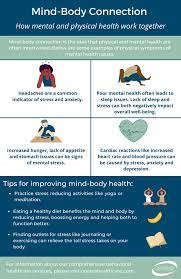
In the ever-evolving realm of health and wellness, the intricate relationship between mental health and physical well-being has gained immense prominence. While there are countless factors that influence our overall health, the mind-body connection stands out as a profound and fascinating phenomenon that plays a pivotal role in determining our quality of life. In this comprehensive article, we explore the intricate ways in which our mental state affects our physical well-being, shedding light on this essential aspect of holistic health.
Understanding the Mind-Body Connection
The mind-body connection is not a novel concept; its significance has been recognized for centuries. At its core, this concept underscores the intricate interplay between our mental and physical health. It acknowledges that our thoughts, emotions, and mental state can have a profound impact on our physical health, influencing the functioning of our body systems, and even our susceptibility to diseases.
Stress: The Silent Culprit
One of the most prominent aspects of the mind-body connection is the role of stress. In today’s fast-paced world, stress has become an epidemic, affecting millions. Chronic stress, in particular, is a silent but potent factor in the development of various physical health problems. When we’re stressed, our bodies release stress hormones like cortisol and adrenaline. Over time, the continuous release of these hormones can lead to a range of issues, including high blood pressure, digestive problems, and a weakened immune system.
Mental Health and the Immune System
The immune system, our body’s natural defense mechanism, is profoundly affected by our mental state. Studies have shown that individuals experiencing chronic stress or depression may have compromised immune systems. This makes them more susceptible to infections and other health issues. On the contrary, a positive mental state can boost the immune system, enhancing the body’s ability to ward off illnesses.
The Influence of Emotions on Heart Health
Our emotional state is closely tied to heart health. Negative emotions, such as anger and chronic anxiety, can contribute to heart problems. These emotions trigger the release of stress hormones, which, when consistently elevated, can lead to heart disease, high blood pressure, and other cardiovascular issues. On the flip side, positive emotions like happiness and love can have a protective effect on the heart, reducing the risk of heart-related conditions.
Mental Health and Chronic Pain
Chronic pain is a debilitating condition that affects millions of people worldwide. Interestingly, the severity of chronic pain can be exacerbated by mental health conditions. Conditions like anxiety and depression can increase the perception of pain, making it more challenging to manage. Therefore, addressing the mental health component is vital in managing chronic pain effectively.
The Power of Mindfulness and Meditation
In recent years, the practice of mindfulness and meditation has gained significant attention for its positive impact on the mind-body connection. These techniques promote relaxation, reduce stress, and enhance emotional well-being. Research has shown that individuals who regularly practice mindfulness and meditation enjoy improved physical health, including better sleep, reduced inflammation, and stronger immune responses.
The Role of Nutrition in Mental Health
Nutrition plays an integral role in both mental and physical health. A diet rich in essential nutrients, such as omega-3 fatty acids, antioxidants, and B vitamins, can support cognitive function and emotional well-being. Conversely, a poor diet lacking in these vital nutrients can contribute to mental health disorders and physical health problems.
Seeking Professional Help
Recognizing the profound impact of the mind-body connection, it’s crucial to understand that seeking professional help for mental health concerns is not a sign of weakness. Mental health professionals can provide guidance and support to improve your mental well-being, which, in turn, can have a positive impact on your physical health.